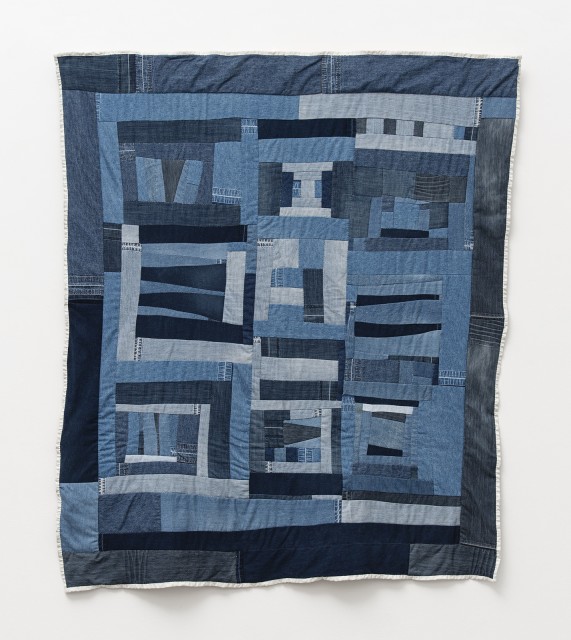Loretta Pettway Bennett (b. 1960, Boykin, AL, US) lives and works as a third-generation maker of quilts in Huntsville, Alabama after being born and raised in nearby Gee’s Bend (officially known as Boykin), a remote Black community of a few hundred inhabitants, many of whom descended from freed slaves from the Pettway plantation (including the artist herself). The geographic isolation of Gee’s Bend has fostered a unique environment for both the women’s art community and their chosen method of quilting. The experimental processes and compositional language of the quilts have been passed down through generations of Gee’s Bend residents, from grandmothers to mothers to daughters. This idea of inherited knowledge is a key part of Loretta Pettway Bennett’s work as her mother, Qunnie Pettway (1943-2010), and grandmother, Candis Mosely Pettway (1924-1997), were both notable quiltmakers from Gee’s Bend. Uninhibited by the conventions of fine or folk art and created out of necessity to insulate their beds on cold nights, the Gee’s Bend quilts constitute a crucial chapter in the history of American art, despite the fact that they were not originally conceived as artworks. The vivid and multi-layered textiles preserve numerous vocabularies and approaches to form and colour; the interplay between symbols and asymmetry refers to histories of African textiles while also evoking the formal qualities of Modernist painting. The work in this exhibition is a quilt titled Human’s Jeans (2019-20) that the artist made in memory of her late husband who passed away in 2018. After a two-year hiatus from quilting and after donating all of her husband’s clothes to charity, Pettway Bennett took up her needle once again, splicing together scraps of denim that her best friend gave the artist from her old denim skirts and other thrift store finds to make a robust and functional object featuring an asymmetrical abstract design that both pulsates with the vibrancy of the artist’s family’s lived experience and embeds the Gee’s Bend community’s darker history of indentured servitude into the very fabric of the work. In the artist’s own words, ‘My heart and my hands were finally ready to sew again’. During the Civil Rights Movement, the community gained national recognition when they established the Freedom Quilting Bee collaborative and distributed their quilts across the United States. The first major museum exhibition dedicated to the quilts of Gee’s Bend was presented in 2002 at the Museum of Fine Arts, Houston, TX, and The Whitney Museum of American Art, New York, NY. In 2006, the book Gee’s Bend: The Architecture of the Quilt was launched at the Museum of Fine Arts, Houston, TX; that same year, the U.S. Postal Service issued ten commemorative stamps featuring images of Gee’s Bend quilts. More recently, works were shown in History Refused to Die: Highlights from the Souls Grown Deep Foundation at the Metropolitan Museum, New York, NY (2018). The quilts of Gee’s Bend are now in many prominent museum collections including Philadelphia Museum of Art, Philadelphia, PA; Fine Arts Museums of San Francisco, CA; The Museum of Modern Art, New York, NY; High Museum of Art, Atlanta, GA; and Museum of Fine Arts, Boston, MA. In the UK, the work of the Gee’s Bend Quiltmakers was first shown in 2020 in the exhibition We Will Walk – Art and Resistance in the American South at the Turner Contemporary, Margate, UK and then in 2020-21 at the Alison Jacques, London, UK. She is represented by Alison Jacques in London.
